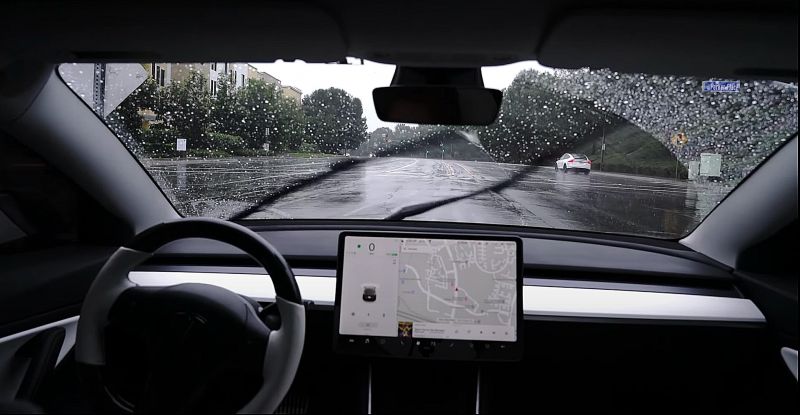Tesla is Recalling Roughly 27,000 Vehicles to Address Windshield Fogging Problem, its 3rd Recall This Year
【Summary】Electric automaker Tesla is recalling nearly 27,000 vehicles, its third recall this year. For the latest recall, a faulty heat pump valve could open unintentionally and trap refrigerant inside the evaporator, resulting in decreased performance of the windshield defroster. The recalled vehicles include some 2021-22 Model 3 sedans, Model S and Model X and certain Model Y vehicles that include a heat pump.

Electric automaker Tesla is recalling nearly 27,000 vehicles, its third recall this year. For the latest recall, a faulty heat pump valve could open unintentionally and trap the refrigerant inside the evaporator, resulting in decreased performance of the windshield defroster.
The recalled vehicles include some 2021-22 Model 3 sedans, Model S and Model X and certain Model Y vehicles that include a heat pump.
Tesla's electric vehicles do not have a gas engine and a pressurized cooling system to keep the engine cool like a conventional vehicle. For gas-powered vehicles, the hot antifreeze and water mixture is used to heat the cabin. But Tesla uses a heat pump to quickly warm up the cabin for passengers as well as for the windshield defrosters when the temperature drops below freezing.
In vehicles built with a heat pump, the Electronic Expansion Valve (EXV) may experience controller communication interruptions. If this occurs, the software-controlled EXV driver may attempt to realign itself by rotating towards the open direction. If this occurs, the vehicle software does not close the valve, which may cause an unintended "valve opening event", according to technicial documents filed with the The U.S. National Highway Traffic Safety Administration (NHTSA).
The problem can lead to refrigerant becoming trapped in the evaporator. The trapped refrigerant can cause decreased performance of the air conditioning system, which can be sufficient enough to reduce the windshield defogger performance.
The problem surfaced after a software update in December. Shortly after the update was pushed to vehicles, Tesla began receiving complaints from customers who brought their cars in for service complaining of a loss of heating performance in extreme cold weather conditions. An investigation into potential causes then began.
Last month, Tesla was subject to a similar investigation by The U.S. National Highway Traffic Safety Administration (NHTSA) after reports of customers in Canada having problems with the heat pumps in their vehicles. The problem is exacerbated in extremely cold climates, where the heat pump is used to quickly defrost the windows.
Transport Canada said it was concerned that a malfunctioning heating and air-conditioning system "may affect windshield defogging/defrosting and therefore driver visibility."
The NHTSA said its continuing to gather information to evaluate potential safety concerns.
Tesla said its will fix the latest heat pump problem with a free over-the-air software update. Notification letters are expected to be mailed to customers by April 1, 2022.
Tesla's other recent recalls are for its "Full Self-Driving" (FSD) software that may cause the vehicle to not come to a complete stop at stop signs. The recall affects 54,000 vehicles with the beta version of its more advanced FSD autonomous driving feature. Tesla said it will disable the feature with an over-the-air software update, which is expected to be sent out early this month.
The FSD software recall covers Model S sedans and X SUVs from 2016 through 2022, as well as 2017 to 2022 Model 3 sedans and 2020 through 2022 Model Y SUVs.
The other recall is for faulty seat belt reminder chimes in some Tesla vehicles.
Tesla is recalling 2021-2022 Model S sedans and Model X SUVs, 2017-2022 Model 3, and 2020-2022 Model Y vehicles to address the malfunctioning seat belt chimes. The problem is that the audible chime may not activate when the vehicle starts and the driver has not yet buckled their seat belt.
The seat belt chime issue will also be corrected by an OTA software update, which will be free of charge. Owner notification letters for this recall are also expected to be mailed on April 1, 2022.
-

Two Ford Crown Victorias Still Operating as Taxis in NYC
-

Mazda CEO's Opinion on EV Adoption in the U.S.
-

Hyundai's revolutionary powertrain design
-

Sustainability focus urged by Michelin Fleet Panel
-

BM Catalysts' UK Expansion
-

Warwick University's £12m funding for electric vehicle battery progress
-

Executive X Series: Unveiling the Powerful City/Vios Competitor
-

Hollywood couple defies expectations, showing affection after 20 years
- 2023 Jeep Grand Cherokee Trailhawk Now PHEV Only
- Tesla’s Battery Supplier Panasonic is Close to Selecting the Site of its New U.S. Battery Plant
- Ford is Investing $3.7 Billion and Adding Over 6,200 UAW Manufacturing Jobs in the Midwest to Produce New Vehicles
- Panasonic Announces Multi-Year Agreement to Supply Electric Vehicle Batteries to Lucid Group
- Toyota is Working With the U.S. Dept of Energy to Advance ‘Megawatt-Scale’ Fuel Cell Powered Stationary Energy Generators
- Tesla Raises Prices in the U.S. as Inflation Chips Away at its Profit Margins
- GM Expanding First Responder Training Program for EV Crashes
- California DMV Accuses Tesla of Making False Claims About its Driver-Assist Systems
- Chevrolet Bolt EV, Bolt EUV Get Dramatic Price Cuts
- Nexar Releases its ‘Driver Behavioral Map Data’ That Can Help Autonomous Vehicles Operate More Like Human Drivers



















 About Us
About Us Contact Us
Contact Us Careers
Careers